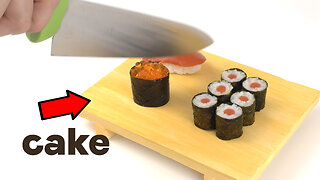Premium Only Content

Pralines and Crows: The Magical Folktales of Aunt Mymee and Little Dove's Son
The excerpt opens in a cabin filled with the enticing aroma of pralines, a traditional confection made with New Orleans molasses, brown sugar, chocolate, butter, and various nuts. The characters, which include Tow Head, Aunt Mymee, Big Angy, Granny, Aunt Em'ly, and Aunt Mary, engage in a lively discussion about their favorite foods, with different preferences voiced throughout the scene. Aunt Mymee, known for her storytelling, triggers a hunger for tales among the group, leading her to recount the folklore of the crows and the enchanting story of Little Dove's son. In her story about the crows, Aunt Mymee narrates how formerly white crows turned black due to a fateful encounter with a conjure woman. During a gathering, the crows discovered a cornfield left unguarded by a scarecrow and, driven by hunger, they feasted on the corn without realizing that the land was bewitched. Under the influence of a charm spoken by the conjure woman, they became intoxicated, ultimately being captured by her. The crows managed to escape, becoming forever changed in appearance and unable to revert to their original color, symbolizing the consequences of their reckless actions and ignorance. Transitioning to another tale, Big Angy shares the story of Little Dove, an exceptionally beautiful maiden whose indifference to suitors sparks jealousy among other young women. While seeking cherries alone, she encounters a handsome stranger who helps her gather the fruit, but their interaction leads her to unconsciousness. When she returns to her village after what she perceives as just a few hours, she is met with disbelief and scorn, having been mourned as dead. Her past friends shun her, leading her to live in solitude under the elm tree where this misfortune occurred. The narrative unfolds with Little Dove experiencing profound sadness and despair, particularly after her father's love for her wanes and the villagers mock her for "going out to gather cherries." In time, however, she gives shelter to an elderly woman, whose presence alleviates her loneliness. This old woman offers hope, suggesting that the warrior may return to reclaim his magic and restore Little Dove’s standing in the community. As the passage of time reveals the birth of Little Dove's son beneath the same elm tree, she learns that he possesses a tuft of brightly colored hair, hinting at his extraordinary heritage. Named Redfeather, the young boy grows to be exceptional, driving him to seek out his father. This quest leads him to experience a transformative journey, wherein he ascends the tree, enters a cloud, and discovers his true lineage. Meeting his father in a lofty realm, Redfeather receives guidance and profound knowledge intended to elevate his people. While experiencing a significant transformation, the boy is trained to bring wisdom and success back to those from whom his mother had been ostracized. However, his loyalty is tested as he helps his mother’s people, ultimately encountering betrayal. Disillusioned, Redfeather renounces the tribe and returns to his mother, who remains hesitant about reconciling with their people. The tale culminates with Redfeather successfully prompting Little Dove to ascend the elm tree alongside him, signifying a return to their rightful place amid the community. Some witness this ascent as a miraculous event, believing it symbolizes redemption and the restoration of familial bonds. Granny, commenting on the story’s moral, emphasizes the idea that pride and jealousy may lead to downfall, encapsulating the life lessons woven through the folklore of Little Dove and her son. Throughout the intertwining narratives, themes of hunger—whether for food or acceptance—serve as a backdrop to the personal growth and transformation of the characters. The stories reflect a rich cultural tradition rooted in the interplay between human emotions, community relations, and the ties that bind individuals to their history and identity. The tales are imbued with lessons on consequences, the importance of humility, and the challenges posed by envy, delivering a rich tapestry of life experiences. In closing, Tow Head, despite initially being troubled by the fate of the crows, finds herself swept away in the imaginative storytelling. Alongside others, she shares in the communal experience of learning from folklore, leaving them to reflect on their own lives and the deep cultural wisdom contained within these traditional tales. The blend of culinary delight with storytelling enriches their bond, serving not only as entertainment but as a means of imparting wisdom across generations. The rhythmic, song-like conclusion of the excerpt highlights the ongoing celebration of food, community, and shared experiences in Afro-American oral tradition.
-
![If You Smell LALALALA What CHiLi IS COOKING!!... #RUMBLETAKEOVER [Overwatch 2]](https://1a-1791.com/video/s8/1/e/s/X/3/esX3u.0kob-small-If-You-Smell-LALALALA-What-.jpg) 4:27:40
4:27:40
CHiLi XDD
6 hours agoIf You Smell LALALALA What CHiLi IS COOKING!!... #RUMBLETAKEOVER [Overwatch 2]
16.4K1 -
 LIVE
LIVE
Delnorin Games
6 hours ago🔴 Live - Star Citizen
509 watching -
 1:39:44
1:39:44
HELMET FIRE
8 hours agoDEADROP IS BACK!
115K6 -
 10:03
10:03
Tundra Tactical
10 hours ago $13.04 earnedBrandon Herrera Vies Bid for ATF Director!
71.1K14 -
 22:01
22:01
DeVory Darkins
1 day ago $32.26 earnedHakeem Jeffries SHUTS DOWN The View as Matt Gaetz Speaks out
62.4K107 -
 2:02:54
2:02:54
Mally_Mouse
9 hours agoLet's Play!! - Spicy Saturday
44.2K1 -
 1:33:06
1:33:06
Slightly Offensive
9 hours ago $26.75 earnedAre You Ready for What's Coming Next? | Just Chatting Chill Stream
63.6K39 -
 32:10
32:10
MYLUNCHBREAK CHANNEL PAGE
1 day agoThe Gate of All Nations
138K61 -
 13:07
13:07
Sideserf Cake Studio
14 hours ago $3.45 earnedIS THIS THE MOST REALISTIC SUSHI CAKE EVER MADE?
56.6K4 -
 21:08
21:08
Clownfish TV
1 day agoElon Musk Tells WotC to BURN IN HELL for Erasing Gary Gygax from DnD!
44.9K15